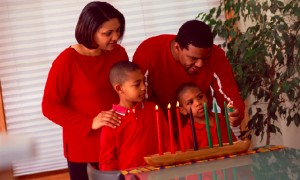

 |
 |
Quick Study: What Is The Meaning Of Kwanzaa ? Celebrations for the 45th anniversary of Kwanzaa have already begun, which may seem odd at first (since its not an
over-hyped shopping holiday), but given that the recession is widening economic
gaps between Blacks, the need for
a non-commercialized, culturally unifying time of reflection may be urgent. Kwanzaa was born of the Black
Liberation Movement of the 60’s. Dr. Maulana Karenga, co-founder of theOrganization Us, developed the seven-day holiday to align with the organization’s seven
principles, Ngozu Saba, and to promote its philosophy of reaffirming and
restoring the “best of” African thought and practice. Its name is derived from the
phrase “matunda ya kwanza,” which means “first fruit” (It is said the second
“a” was added to the holiday spelling to create symmetry between the word
length and the number of principles), and it is stressed that it is not a
religious ceremony, rather a culturally inclusive one. In fact, ingathering is a major
theme: The language of Kwanzaa, Swahili, was chosen because it is widespread
across the mother continent and has a lack of tribal association. It is now celebrated by millions
around the world (though no accepted survey has been conducted, estimates range
from approximately 5 million to as many as 30 million), and Dr. Karenga and his
wife have presided over hundreds of ceremonies. While there is not much
formalization of how the week is spent, it is centralized by the principles –
Umoja (Unity), Kujichagulia (Self-Determination), Ujima (Collective Work and
Responsibility), Ujamaa (Cooperative Economics), Nia (Purpose), Kuumba
(Creativity) and Imani (Faith) – each given a dedicated day and candle lighting
beginning every year on December 26 and ending January 1. A kinara (or, “candle holder”)
with seven candles – one black, the first to be lit, to represent the people;
three red to represent the struggle; and three green to represent the
prosperity – placed upon a mat and an African cloth, and flanked with at least
two ears of corn to represent the communal harvest tradition and a Unity cup
from which to pour libration are the only symbolic requirements. No gifts
necessary. But, it is recommended that the final day is a sober meditation,
asking: Who am I? Am I really who I say I am? Am I all I ought to be? Considering most of us may be in
the midst of an intoxicating New Year’s Eve celebration the night before, it
might just be a good idea. Sia Tiambi Barne  |
 Sommaire 2011 |